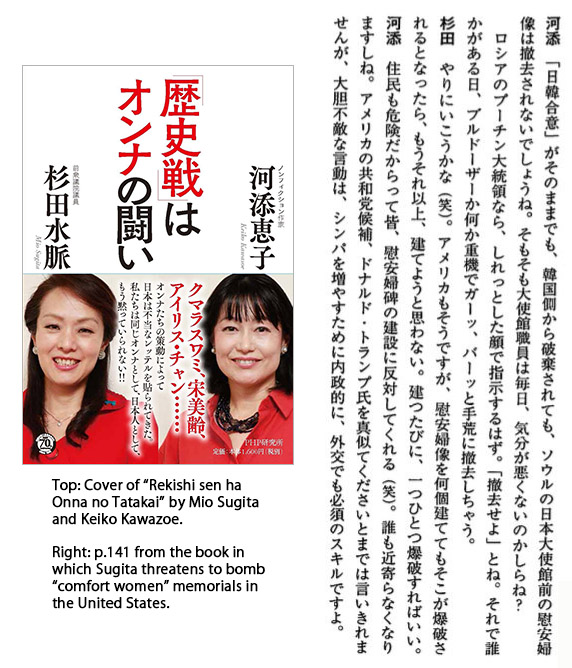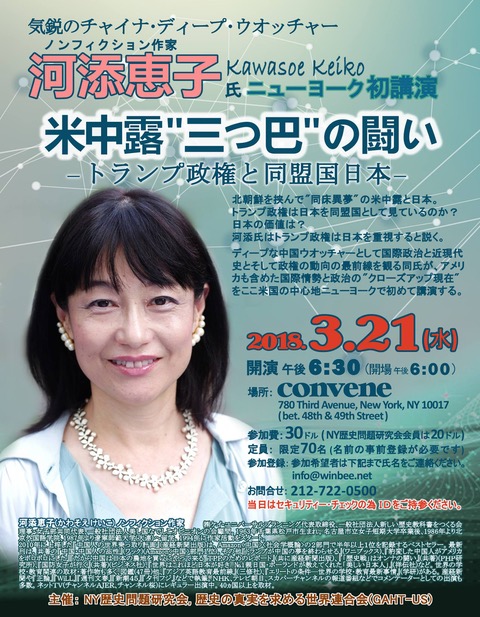Kaoli Koyasu (子安香) is the founder of the New York City-based Japan Mahoroba Station (JMS) and a comfort women denier. She has spoken at various comfort women denier events, including Texas Night in NYC (2015) and the Nadeshiko Action panel at the UN Commission on the Status of Women NGO Parallel Events (2016).
Koyasu is also a member of the U.S. branch of Texas Daddy Japan Secretariat.
Kazuyoshi Hanada (花田紀凱) is a right-wing magazine editor and comfort women denier. He has been the editor-in-chief of several magazines, most recently for the right-wing WiLL (2004-2016) and Monthly Hanada (2016-).
In 1995 Hanada was the editor-in-chief of Marco Polo, a monthly men’s magazine, which published an article disputing the existence of gas chambers at Nazi concentration camps. After international criticisms, he was fired and the magazine was discontinued.
In 2006 as the editor-in-chief of WiLL, Hanada wrote an internet rumor about the former leader of the Social Democratic Party being a Korean as a fact. The court determined the article to be an obvious falsehood and ordered Hanada to pay compensation.
Hanada was a co-singer to Channel Sakura’s letter protesting the U.S. H.Res.121 demanding Japan to “accept historical responsibility” for the treatment of comfort women.
Keiko Kawasoe (河添恵子) is a self-described “non-fiction writer” and a comfort women denier.
In the book “Women Fight the History War” (Rekishisen ha onna no tatakai), Kawasoe and co-author Mio Sugita propose bombing attacks against comfort women memorials erected in the United States. “Nearby residents will oppose further construction of comfort women memorials out of fear!” exclaims Kawasoe.
In the same book, Kawasoe warns readers of an “Illuminati conspiracy” aimed at turning Japan into a “gender-free communist state.”
Kawasoe has also provided a promotional blurb for a fake “spiritual interview” book published by Happy Science on “The Rape of Nanking” author Iris Chang in which Chang’s “spirit” confesses to fabricating historical accounts of Japanese military atrocities in Nanking to defame Japan.
In March 2018, Kawasoe joined Global Alliance for Historical Truth’s panel titled “The Role of Women in Japan” during the 2018 United Nations Commission on the Status of Women NGO Parallel Events in New York. While there, she also gave a talk at another event organized by GAHT and New York Historical Issues Study Group for Japanese audience.


Kent Gilbert is a former Mormon missionary and California lawyer turned television personality in Japan. Gilbert was a popular figure in Japanese TV variety shows during the 1980s, but in recent years became a mouthpiece for the Japanese far-right nationalism. Gilbert authored many books in the past few years in defense of Japanese nationalism, militarization, and historical record (i.e. war crime denial), including those co-written with fellow American Tony Marano.
Kiminobu Kimura (木村公宣) was the New York chapter director of Happy Science. As a representative of the non-existant front group “Society to Promote Correct Historical Views,” Kimura was one of the main speakers in Texas Night in NYC (2015), a comfort women denier event.
Kiyoshi Hosoya (細谷清) is a comfort women denier and self-styled “researcher” of modern Japanese history, even though his background is in business development and management. Hosoya is the secretary general of the Researchers of History on Modern Japan (HMJR, 日本近現代史研究会) and a board member of Global Alliance for Historical Truth (GAHT), both denier groups. He is also affiliated with the Japan Family Value Society (FAVS, 家族の絆を守る会), part of Japan Conference’s anti-feminist network.
Hosoya co-authored the booklet “Comfort Women Issue: From Misunderstandings to Solution” with Yumiko Yamamoto of Nadeshiko Action.
Kohyu Nishimura (西村幸祐) is a journalist who has covered sports until the 2002 World Cup Soccer co-hosted by Japan and South Korea, which apparently turned him into a critic of Korean culture and society. He has contributed nationalistic articles to conservative magazines such as Seiron and WiLL and was the founding editor in chief of far-right nationalist magazine JAPANISM.
Nishimura is a member of Committee for Historical Facts, the group responsible for comfort women denier opinion ads The Facts (2007) and Yes, we remember the facts. (2012). He characterizes international criticisms against Japan’s handling of the comfort women issue as the “intelligence warfare” conducted by “anti-Japanese fascists.”
Nishimura is credited as the supervising editor for the comfort women denier Tony Marano’s 2014 book, “Okore! Wana ni kakatta nihonjin (Get enraged! Japanese people caught in a trap).”
Koichi Mera (目良浩一) is a comfort women denier and the founder and president of Global Alliance for Historical Truth (GAHT).
Mera was born in 1933 in Seoul, Korea, which was under Japanese rule at the time. He received his bachelor’s degree in engineering/architecture from University of Tokyo and Ph.D from Harvard University (urban planning) which he attended as a Fulbright scholar. He has since worked for the World Bank, University of Tsukuba, Tokyo International University, and University of Southern California. He retired from USC in 2008.
In 2006 Mera founded the Study Group for Japan’s Rebirth (日本再生研究会), a monthly Japanese-language study group on modern Japanese history for Japanese residents in Southern California. Members of the study group protested the 2013 establishment of a comfort women memorial in Glendale, California. In 2014 Mera founded GAHT to sue the City of Glendale in federal district court.
After moving to the East Coast, Mera founded “Princeton Institute for Asian Studies” to promote revisionist historical views about comfort women, Nanking massacre, as well as Japan’s attack on Pearl Harbor. The “institute” was immediately rebuked by Princeton University, which it has no affiliation with, and renamed “Pacific Institute for Asian Studies.”
Mera passed away in December 2019.
Selected Publications
- マッカーサーの呪いから目覚めよ日本人! (Wake up from MacArthur’s Curse, Japanese People!). 2012. Co-authored with Yasuo Inoue (井上雍雄) and Sadao Imamori (今森貞夫)
- Comfort Women not “Sex Slaves” (2015). Self-published.
Koichi Sugiyama (すぎやまこういち) is a composer most known for creating music for popular video game series Dragon Quest and a comfort women denier. As a member of the Committee for Historical Facts, he singlehandedly financed the paid advertisements The Facts (2007) and Yes, we remember the facts. (2012).
Kono Statement (慰安婦関係調査結果発表に関する河野内閣官房長官談話) is a 1993 statement by the Cabinet Minister Yohei Kono (河野洋平) which is widely seen as a formal admission by the Japanese government of the role Japanese government played in the recruitment, transfer, and control of comfort women during the WWII. Comfort women deniers have since been calling for the retraction or backtracking of the statement or delegitimizing it by dismissing it merely as a personal opinion of Kono himself or a political compromise lacking any actual evidence.
In particular, comfort women deniers criticize Kono Statement for “falsely” acknowledging the direct involvement of the Japanese military in the forcible recruitment and kidnapping of women for use in the military comfort stations. Japanese government has backtracked on this portion, explaining that it was in reference to a specific case of the military discipline breakdown, and not applicable to the recruitment of comfort women in general.
Japanese Ministry of Foreign Affairs parrots Kono Statement as the evidence that Japan has already taken responsibility for its role in the abuse of women under the military comfort women system, such as in response to the proposal in San Francisco to establish a memorial dedicated to comfort women, the wording of the statement leaves ambiguous what responsibility the Japanese government is acknowledging, especially it backtracked on the part that addresses the direct involvement of the Japanese military in the forcible recruitment and kidnapping of women.
In February 2014, Deputy Cabinet Minister under Kono at the time the statement was released told the parliament that the administration at the time did not verify testimonies of comfort women surveyed by the South Korean government, and it was “possible” that South Korean government was involved in the drafting of the statement. Prime Minister Shinzo Abe ordered an investigation into the process behind the release of Kono Statement and released a report in June of that year, which was seen as a way to delegitimize and backtrack Kono Statement while avoiding diplomatically costly retraction.
Link: Kono Statement (unofficial translation)


